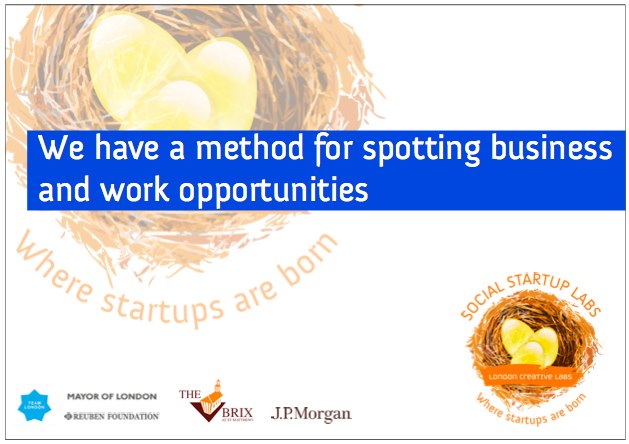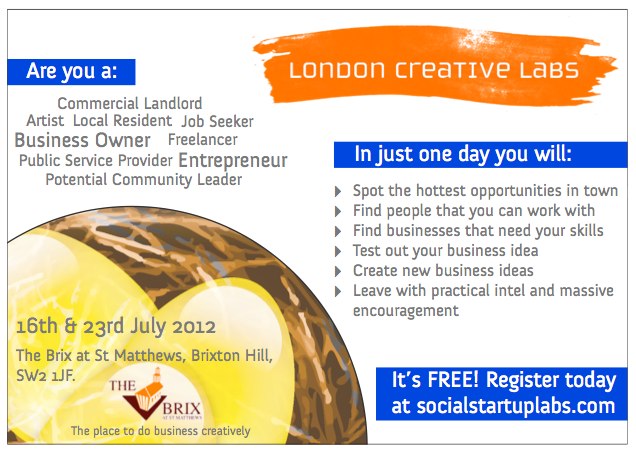Frequently Asked Questions
-
“Why bother”? The manifesto behind London Creative Labs
-
What is a Social Business?
-
What is the difference between Social Business and Social Enterprise?
-
What kind of Social Business is London Creative Labs?
-
What kind of Social Business does London Creative Labs seek to foster?
-
Who is behind London Creative Labs?
-
What is the relationship of London Creative Labs to Grameen and to BRAC?
“Why bother”? The manifesto behind London Creative Labs
- From Bangladesh, one of the poorest countries in the world, some of the smartest entrepreneurial solutions have arisen to tackle extreme poverty and climate change.
- What can we do in one of the wealthiest countries in the developed world do to match this creativity and make a real difference in eradicating poverty and need on British soil, as well addressing wider issues of environmental sustainability?
- Social Business presents us with the ultimate entrepreneurial challenge.
- To address societal challenges using smart and creative business solutions.
- London Creative Labs believes we can, and we must.
What is a Social Business?
The 7 principles of Social Business as defined by the Nobel Prize-winning Dr. Muhammed Yunus and the extraordinary organisation he founded Grameen are:
- Business objective will be to overcome poverty, or one or more problems (such as education, health, technology access, and environment) which threaten people and society; not profit maximization
- Financial and economic sustainability
- Investors get back their investment amount only. No dividend is given beyond investment money
- When investment amount is paid back, company profit stays with the company for expansion and improvement
- Environmentally conscious
- Workforce gets market wage with better working conditions
- …do it with joy
What is the difference between Social Business and Social Enterprise?
Social Business goes a little further than social enterprise. Social Business is not a new concept, Social Businesses from organisations like BRAC and Grameen have existed for over 30 years. Michael Young set up the Young Foundation and set up several social enterprises in his lifetime, the most well known is the Open University which is well established as a great British institution.
Deeper Principles: What Social Business means to us:
It is about system re-design. You cannot do system redesign unless you look at the whole system and tackle it with the big picture in mind, else you make worse existing problems that are missed by not having the full system of relationships represented.
It is about scaling up solutions that work, rather than maintaining small one-off initiatives so that new environments are created that enable Social Business not just to compete with but out-compete business-as-usual in making a real social impact.
It is about identifying blueprints of business models that work that can be replicated in other places. it recognizes that in order to replicate social business models, they have to be very sensitively and carefully transferred. No “cutting and pasting is possible.
So although social entrepreneurship is a step in the same direction, social business goes a bit further by its greater emphasis on a “whole systems” approach; the deeper problems of a society or a community need to be addressed by treating society as a system. (Society is in fact a system of systems!) Some social enterprises have this approach but not all.
Compare this to a charity:
- You donate money
- You do not get it back
- The organization needs to looking for donors and funds once the initial funds run out
- There is a degree of restriction that can be quite severe, in terms of what the organization can and cannot do.. This can be very appropriate for certain parts of society, such as child safety. Regulation is then appropriate.
We are not saying that charities should not exist. Just that our prime focus is to tackles societal challenges through the creation of Social Businesses.
What kind of Social Business is London Creative Labs?
London Creative Labs will operate as a Grameen Social Business.
What kind of Social Business does London Creative Labs seek to foster?
We seek to foster the creation of Social Business of the more general definition. There are many business models out there that we believe are effectively like Social Business. We want to encourage systemic and disruptive social innovation.
So we are here to explore which business models can enable this and the different forms of Social Business that are possible, that would enable the societal transformation that we believe is possible. Hence we are open but our focus is firmly on the social impact.
In the dialogue with Muhammad Yunus, one of our team, Paul Rose told him of his work engaging corporates which were not necessarily Social Businesses. He asked Dr Yunus what he thought of that.
Dr Yunus’ response was “Go ahead. If they are doing something good then go ahead.” He is not prescriptive. His style is not prescriptive. Yet he guards the principle of the Grameen Social Business. This approach is important to me, to allow people to do what they like, but encourage them to be clear about what it is that they do, and why.
Who is behind London Creative Labs?
Sofia Bustamante founded London Creative Labs in July 2009 after an inspiring trip to Bangladesh where she saw what BRAC and Grameen had accomplished.
Many people contributed time, energy, and resources in the startup phase and they were acknowledged in the Conversations page. A more current list of attributions is now updated every few months at people page.
What is the relationship of London Creative Labs to Grameen and to BRAC?
London Creative Labs came out of massive inspiration. From a dialogue with Muhammud Yunus to a meeting with Grameen Secretariat in Dhaka and Grameen Creative Lab in Germany, the scene in London is set for collaboration with these organisational beacons.
London Creative Labs operates independently but cultivates relationships with these organisations, which are acting like mentors at this early stage.
We support the work of the Grameen Creative Labs and have established a relationship with Grameen Creative Lab in Scotland and in Germany. The Grameen Secretariat at its Dhaka headquarters advises us on all things Grameen.
We only discovered BRAC on our last trip to Bangladesh. We love what they do and are in contact with the secretariat for any deeper questions about BRAC and its operation.
In essence, we believe we are all in the same boat and working towards the same thing. When we met, Hans Reitz the Grameen Creative Lab (Berlin) Director, he described a garden of 1000 flowers. It is Dr Yunus’ metaphor for many people being inspired and addressing issues in different ways.
I am looking forward to discover what kind of ecosystem London needs for Social Business to thrive, and how we can make that happen. This will be of interest to other cities in the developed world and so we will be collaborating openly with Grameen and related organisations.


